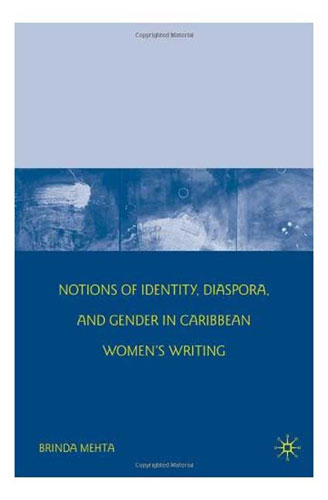
Brinda Mehta’s Notions of Identity, Diaspora, and Gender in Caribbean Women’s Writing (Palgrave Macmillan, 2009) uses a unique four-dimensional lens to frame questions of diaspora and gender in the writings of women from Martinique, Guadeloupe, and Haiti. These divergent and interconnected perspectives include violence, trauma, resistance, and expanded notions of Caribbean identity. In these writings, diaspora represents both a wound created by slavery and Indian indenture and the discursive praxis of defining new identities and cultural possibilities. These framings of identity provide inclusive and complex readings of transcultural Caribbean diasporas, especially in terms of gender and minority cultures.
According to reviews posted by Palgrave Macmillan, Renée Larrier (author of Autofiction and Advocacy in the Francophone Caribbean) observes that Mehta’s “brilliant, richly textured analysis of texts by Maryse Condé, Edwidge Danticat, Laure Moutoussamy, Gisèle Pineau, and Evelyne Trouillot reveals a dialogue across generations and locations.” Walter D. Mignolo (William H. Wannamaker Professor of Romance Studies and Professor of Literature, Duke University) considers Notions of Identity, Diaspora, and Gender in Caribbean Women’s Writing to be “a signal de-colonial contribution of irresistible shifting processes to global reconfigurations of world order, illusionary geographies, and power relations.”
Brinda Mehta is Professor of French and Francophone Studies at Mills College. She is the author of Rituals of Memory in Contemporary Arab Women’s Writing; Diasporic (Dis)locations: Indo-Caribbean Women Writers Negotiate the Kala Pani (winner of the Frantz Fanon Award for Outstanding Work in Caribbean Thought); and Corps infirme, corps infâme: la femme dans le roman balzacien. She is currently working on her fifth book, Creative Resistance: The Dissident Voices of Arab Women. She is also the Caribbean Philosophical Association’s Secretary for the Indo-Caribbean.
[Many thanks to Nelson Maldonado, president of the Caribbean Philosophical Association, for bringing this information to our attention.]
For more information, see http://us.macmillan.com/notionsofidentitydiasporaandgenderincaribbeanwomenswriting
